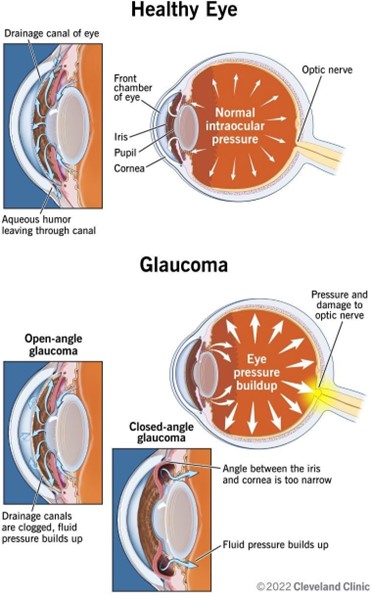The practical nurse (PN) is reviewing a client's recent ophthalmic screening test results. Findings of optic neuropathy, loss of peripheral vision, and increased intraocular pressure are consistent with which medical condition?
Glaucoma.
Macular edema.
Cataract.
Diabetic retinopathy.
The Correct Answer is A
Glaucoma is a group of eye diseases that damage the optic nerve and cause vision loss. It is often associated with increased intraocular pressure, which can compress the nerve fibers and reduce blood flow to the retina. The most common type of glaucoma, open-angle glaucoma, causes gradual loss of peripheral vision.

The other options are not correct because:
A. Macular edema is a condition that causes swelling and fluid accumulation in the macula, the central part of the retina that is responsible for sharp and detailed vision. It can cause blurred or distorted vision, but it does not affect the optic nerve or the peripheral vision.
B. Cataract is a condition that causes clouding of the lens, which is the transparent structure that focuses light onto the retina. It can cause blurred, dim, or yellowed vision, but it does not affect the optic nerve or the intraocular pressure.
C. Diabetic retinopathy is a complication of diabetes that damages the blood vessels in the retina and causes bleeding, leakage, or scarring. It can cause blurred, fluctuating, or darkened vision, but it does not affect the optic nerve or the intraocular pressure.
Nursing Test Bank
Naxlex Comprehensive Predictor Exams
Related Questions
Correct Answer is B
Explanation
This is the best response for the PN to provide because it sets a clear and firm boundary for the adolescent and discourages inappropriate or sexual comments. The PN should also redirect the adolescent's attention to another topic or activity and document the incident.
A. The size of my breasts is of no concern to you is not the best response because it may sound defensive or sarcastic and may not deter the adolescent from making similar comments in the future.
C. Do you really think so? is not the best response because it may encourage or reinforce the adolescent's inappropriate or sexual comments and may imply that the PN is interested or flattered by them.
D. If you talk like that again, I will tell your parents is not the best response because it may sound threatening or punitive and may not address the underlying issue of the adolescent's behavior. The PN should inform the parents only if the behavior persists or escalates.
Correct Answer is ["B","D"]
Explanation
The correct answers are Choice B and D:
Choice B: Report the appearance of the dressing to the charge nurse,
Choice D: Compress the drainage device before closing the tab.
Choice A rationale:
Documenting the appearance of the wound as inflamed is not appropriate. As a practical nurse, the immediate concern is to take action and report any concerning findings to the appropriate healthcare provider rather than just documenting it.
Choice B rationale:
Reporting the appearance of the dressing to the charge nurse is essential. The charge nurse or a more experienced healthcare provider needs to be informed of any abnormal findings or signs of infection for further evaluation and appropriate intervention.
Choice C rationale:
Removing the drainage device and applying a pressure dressing is not within the scope of practice for a practical nurse. These actions require a higher level of expertise and are typically performed by a registered nurse or healthcare provider.
Choice D rationale:
Compressing the drainage device before closing the tab is a correct action. This helps to ensure that the device is functioning properly, and there are no leaks or obstructions in the drainage system.
Choice E rationale:
Clamping the drainage tubing for the next four hours is not recommended unless specifically ordered by a healthcare provider. Clamping the drainage tubing without appropriate orders may disrupt the normal drainage process and cause complications.
Whether you are a student looking to ace your exams or a practicing nurse seeking to enhance your expertise , our nursing education contents will empower you with the confidence and competence to make a difference in the lives of patients and become a respected leader in the healthcare field.
Visit Naxlex, invest in your future and unlock endless possibilities with our unparalleled nursing education contents today
Report Wrong Answer on the Current Question
Do you disagree with the answer? If yes, what is your expected answer? Explain.
Kindly be descriptive with the issue you are facing.
